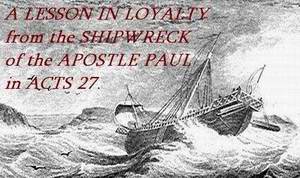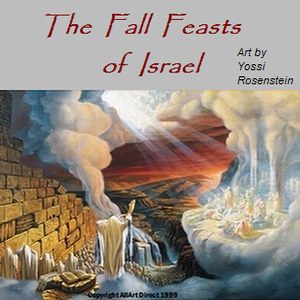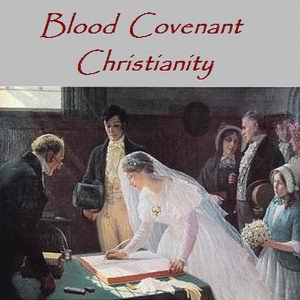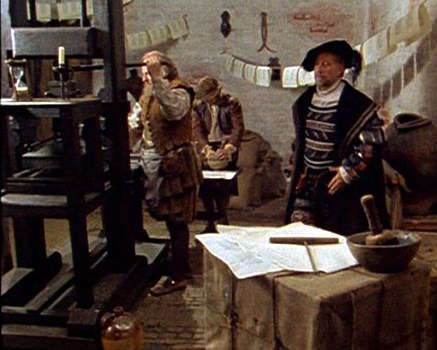 Our journey of discovery to seek the roots of the Puritans
begins at a time when the Holy Scriptures were coming to
the common man in Europe.
After a thousand years of medieval darkness the Word of God was returning.
In Germany during the mid 1400's Johannes Gutenberg
had invented a printing press with movable type.
This greatly increased the speed of printing books.
These were difficult and dark days for Europe.
The second Jihad had begun and the Turks were attacking
Christendom in the east. High taxes, famine, and peasant uprisings
brought their misery.
But in this same time frame there was something wonderful happening as well.
The Bible was being translated and distributed in large numbers.
And with that the lights were going on all over Europe.
Our journey of discovery to seek the roots of the Puritans
begins at a time when the Holy Scriptures were coming to
the common man in Europe.
After a thousand years of medieval darkness the Word of God was returning.
In Germany during the mid 1400's Johannes Gutenberg
had invented a printing press with movable type.
This greatly increased the speed of printing books.
These were difficult and dark days for Europe.
The second Jihad had begun and the Turks were attacking
Christendom in the east. High taxes, famine, and peasant uprisings
brought their misery.
But in this same time frame there was something wonderful happening as well.
The Bible was being translated and distributed in large numbers.
And with that the lights were going on all over Europe.
With the Bible being translated in the European languages
good copies of the Holy Scriptures
were soon beginning to come off the presses in Germany. Not only that,
they were being printed rapidly in significant numbers
and at prices people could afford.
This was one of the keys to the dramatic
changes seen back in the 1500's. It has been said that
Gutenberg's printing press made the Reformation possible.
Along with the courageous stand by Martin Luther it was
the Bible translators at their wonderful work who lit the
candles and brought the Light of God's Word into the medieval darkness.
The translators unlocked
the Bible from the Latin, the dead language of ancient Rome.
The new printing presses, marvels of German engineering at the time,
were sitting there waiting for the Bible translators
to bring in their manuscripts. And so out came the Bibles into the
hands of the European people.
The illumination of the Word of God changed the hearts and minds
and the motivations of the people who heard.
This was a marvellous turn of events. The impact of the Bible on Western
Civilization along with the good and the evil historical responses to its coming
cannot be overestimated.
John Wycliffe, the 'morning star of the Reformation' had begun this
work with a translation of the Bible into English in the 1300's.
In the 1500's Martin Luther translated the scriptures into the
German language. Luther himself was transformed in the process.
The scriptures opened his eyes to what was going on around him.
He was appalled to see the obvious disparities between what
he saw in the Bible and what was being practiced by the Church of Rome.
The selling of indulgences by the church,
supposedly securing the
release of loved ones from Purgatory, was the last straw for Luther.
Protesting this outrage, and numerous
other grievances he nailed his 95 theses to the door
of the Wittenburg Cathedral.
This sparked off a religious conflagration with the Roman Church
in Germany. With Duke Ferdinand of Saxony and other German princes
coming to his aid Luther avoided
being taken into custody by the Roman church
where he most certainly would have been burned as
a heretic.
Indeed, during the previous century in 1415
this had happened to a faithful
priest in Bohemia,
John Hus.
Luther's stand at the German city of Worms was historic.
It was a defining moment for the church.
And it led western Christendom into the Reformation.
Also in the 1500's Englishmen Miles Coverdale and
William Tyndale
were translating the Bible into English. Tyndale was in exile in Europe.
He lived a life of constant danger,
translating the scriptures and living as a
wanted man. His evangelical friends from Cambridge, John Frith
and William Tewksbury, were both captured and burned at the stake.
For years Tyndale was hunted down by agents of Henry VIII and
the Bishop of London. Since Gutenburg's
printing presses were now proliferating in a big way it was
Germany that was at that time the place to go for good printing work to be done.
The coming of the scriptures to the common man had an enormous
impact on European and English history. The Reformation led to
the evangelical movement. Unfortunately its politicization led
to a great tragedy. The awful 30 Years War wrecked Germany.
It was left in such a ruined state that
it would not recover for 200 years.
The 1500's were years of great change.
The peasants revolted throughout central Europe
during a conflict that would come to known as the Peasant Wars.
During this period of internal strife the Turks took advantage
of the situation. They attacked European Christendom from the east.
The Muslim forces advanced to the point where for a while
they were actually closing in on Vienna.
It was an awful time to be alive in Europe.
It was a time of unprecedented religious, political
and social upheaval.
Out of all this turmoil came
the Anabaptists. These were the
ultimate Christian radicals.
The war in central Europe had gone
on for a whole generation.
Successive Catholic and Protestant
armies had pillaged the countryside taking the lives of young and old.
Germany and the Swiss valleys were left in
in a shambles.
Many were now
migrating out of central Europe
to take refuge in Holland which was to take a dominant role
in European history in the following century.
During the 1600's Dutch sea power and peaceful trade had
made this a place of refuge for many evangelicals.
During the Reformation wars in central Europe
many had seen enough of Christian savagery and barbarism to last several
lifetimes. For many separatist evangelical Christians it got to the point
where they didnít care
which army won. From the scriptures they had come to believe
that Christianity was a matter of
personal faith, not national or church sponsored citizenship.
Nor was it about which
church or cathedral you belonged to. It was all about a covenant
relationship with Jesus Christ and a personal
faith walked out with Him daily.
Accordingly, while they paid their taxes to the governing powers the
Anabaptists resolved to take no oaths of allegiance with the
political or ecclesiastical princes,
whoever they might be. Nor would they take up arms with or against
any army coming into their valleys, whether they were Protestant or
Catholic.
These are the main articles of the
"Schleitheim Confession".
This document was penned by one of the leading lights of the Anabaptist movement,
Michael Sattler at the gathering at Schleitheim, in the mountains of
Switzerland in February of 1527.
For their stand in the peace of Jesus Christ
they were bitterly persecuted from both sides.
Millions of Anabaptists died at the hands of Catholic and Protestant
powers alike. They continued to die for over 200 years. This story
has not been told. It has been cut out of the history books.
From these determined Christian separatists came the peace loving
Amish and Mennonites along with the Brethren and some primitive
Baptists of the free church tradition.
They remember this history. We don't.
Let us make no mistake about this. These saints who had rejected
the sword were still full of Christian zeal. But they had given up
on a church that had corrupted itself by going to bed with the state.
They would prefer to go to their secret Christian
meetings, even if they were under the constant
threat of being arrested. If an Anabaptist met another on the pathway they
would challenge him with the scripture,
"You cannot serve two masters".
If the other man was an Anabaptist he would smile and reply,
"You cannot serve God and mammon".
The pathway they were now going on was a 'highway of holiness'.
~ Isa.35:8-10. The Anabaptists resolved to keep their little church
pure in devotion to Christ. They were weary of seeing the hideous
mixture of the cross and the sword played out before their eyes year
after weary year. The sword had been stained with Christian blood.
To their
mind it had become a despised and shameful thing.
It no longer had the
sacred power of chivalry it once held over them.
They had seen its dark side. It had come to the point
where they were going to turn their back on politics and make the
peaceful preaching of the Gospel their prime concern come what may.
At this time the first missionary outreaches were organized.
The Mennonites, the Baptists, the Brethren and many other
Christian groups began to send out missionaries beyond European shores.
A new era in Christian missions had begun.
THE EMERGENCE OF THE ENGLISH PURITANS IN THE 1500's.
This is where we pick up our story of the Puritans.
The coming of the English Bible was giving rise to
desires for full Reformation of the Church of England.
There was even talk of 'purifying' the Church of England.
It was during the latter part of the 1500's that men like
Thomas Cartwright began to argue for a purified English Christianity.
They wanted to see a Church of England
free of the medieval trappings and vestments
of the Roman Church from which it had come.
These reformist evangelicals came to be called 'Puritans'.
These were dangerous times to express such views. During the
reign of "Bloody Mary",
and throughout the 1500's
many separatist evangelicals
were burned at the stake.
But these persecutions, as usual,
only spread the fires of devotion both inside the Church of
England and outside the national church
in the secret house meetings of the
persecuted 'Non-Comformists'.
In 1603 Protestant King James I
came to the throne. By this time the Puritans were
poised to move their agenda forward.
These were turbulent times. Political extremists were abroad
along with religious separatists.
To the King and his bishops these people were all the same.
As they saw it all these unregulated people were equally dangerous.
Whether they be political dissidents or religious dissidents
they all disturbed the peace with their tiresome petitions for reform.
They interrupted the quiet life of the people
which the leaders had worked so hard to maintain.
In 1605, a Catholic zealot named
Guy Fawkes tried to blow up Parliament.
He and his anarchist friends wanted to kill the king and
as many Puritan parliamentarians as possible.
The plot was discovered and Guy Fawkes was executed.
1611 was a banner year for evangelicals in England.
The King James Bible
went out to the people.
With the more ready access to the scriptures the Puritans
continued to gain in numbers.
King James was forced to put more restrictions on these
movers and shakers. This in turn caused them to
to push even
harder for reform in the Church of England.
Evangelicals in England during those times had two choices.
They could separate from the Church of England and became
Non-Conformists or Pilgrim style Separatists.
Or they could join the Puritans and stay in the system hoping
to reform it from within.
Both streams of evangelical Christianity were persecuted
but the separatists had it far worse.
King James had commissioned the printing of the Holy Scriptures
which sets men free. But under his reign
religious freedom was still not realized.
Englishmen were still forbidden to worship outside the Church of England.
Many Bible believing Christians, under persecution by the king's bishops,
were forced to flee the country.
A Puritan community from the town of
Scrooby left for Holland in 1608.
During this time the expanding Dutch sea trade to India
had made Holland extremely wealthy. The infusion
of new and vital people from the Reformation Wars in central Europe
had enriched Holland in many ways. It was the place to be for
people like godless rationalists and Godly evangelicals,
both groups considering themselves enlightened.
In the 1600's Holland was the trade center of Europe.
It was also the place where new ideas, the
Renaissance arts, (which had originated in Italy),
and ideas could be expressed in peace without church
or governmental interference. This was good for evangelical Christians.
It was also good for humanists, rationalists and freethinkers like Erasmus.
Dutch trade and sea power had made the Netherlands
the dominant power in Europe during that time.
Here people of faith could gather and worship
without fear of persecution. Here too they could educate their children
into a biblical world view with their own Christian schools.
But for the Pilgrims and Puritans from Scrooby, (and others),
Holland was a temporary haven.
But it was not their destiny. The Puritan
fellowship from Scrooby would only stay there in Holland 12 years.
Then they would set forth towards the next stop on their epic journey.
The Pilgrims and Puritans were bound for the New World.
During the fall of 1620 they set sail aboard the Mayflower.
Meanwhile, back in England, the Puritans fumed and fretted
and chafed under the constraints under which their new biblical faith
was forced to operate.
The difficult Pilgrim path of living as "non conformists" and walking
a separated life to Christ was open to them of course.
But the Puritans were committed to the continuation of a church-state union.
So they remained within the Church of England trying to move
the huge medieval colossus with all its "Romish" trappings
forward inch by inch into biblical Christianity.
Being people who believed in 'the system' the Puritans were determined
to change the national church from within. But they were having
a very very frustrating time. Since they were forbidden to worship
outside the Church of England they were stuck. The church that
they believed in just didn't seem to be going anywhere.
The Church of England did provide wonderful opportunity for English Christians
since it cut them off from Roman Catholicism.
But its birth was not a spiritual birth so much as a political one.
Henry VIII had broken the English church free of its moorings
with the Church of Rome.
Now the scriptures were shining a lamp onto the pathway ahead.
Many Englishmen were coming into a personal faith in Christ.
The Puritans were keen to move on out of the medieval darkness.
Yet the bishops, under the kings thumb,
were holding back the very church reforms that these
new Bible reading Christians
considered necessary.
All this was making things very difficult for the emerging Puritans.
They did not want to take the road of 'separation of church and state'
as the Pilgrim separatists were doing. They were not going to
worship secretly. Nor did they want to gather in little fellowships.
They were Englishmen! And they would worship God as Englishmen.
If the system was not with them then their future course was clear.
They would change the system!
If the king wanted them in a single national church that was fine.
But by God's help they were bound and determined to
move the Church of England forward into an enlightened
Biblical Christianity.
The proliferation of Bibles in the 1500's
made these times of great religious discovery.
The Puritan corporate conscience began to
burn within them. They prayed and
they agonized a s they sought to bring
political and social substance to their dreams of a 'nation under God'.
They knew what could and should be done.
And by God's help they were going to make it happen!
In the early 1600's this Puritan zeal was building up
enormous political pressure within English society.
The history that followed was quite predictable.
Here is the
NEXT ARTICLE.

Some more devotional articles on apocalyptic Biblical themes
for the enquiring Christian.

|
|

|

|
|

|







